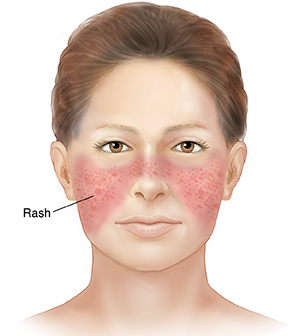Systemic Lupus Erythematosus (SLE): An Autoimmune Disease Overview

Systemic Lupus Erythematosus
Systemic Lupus Erythematosus (SLE) is a chronic autoimmune disease where the immune system attacks healthy tissues, causing inflammation and damage to multiple organs.
🔍 Understanding Systemic Lupus Erythematosus (SLE)
Systemic Lupus Erythematosus (SLE) is a long-term autoimmune condition in which the immune system mistakenly attacks the body’s own cells and tissues. This abnormal response can impact various organs and systems, including the joints, skin, kidneys, brain, lungs, heart, and blood vessels. The severity of SLE can differ widely among individuals and typically requires ongoing medical care.
⚠️ Common Symptoms of SLE
-
Persistent fatigue and low-grade fever
-
Joint swelling, stiffness, or pain
-
Facial rash, often shaped like a butterfly across the cheeks and nose
-
Skin reactions triggered by sunlight
-
Chest pain, headaches, and breathing difficulties
-
Cognitive issues, such as forgetfulness or confusion
❓ What Triggers SLE?
The precise cause of SLE remains uncertain. However, it’s believed to result from a combination of inherited traits, environmental influences (like infections or UV light), and hormonal changes. The immune system starts producing autoantibodies that mistakenly damage healthy body tissues.
🧬 Risk Factors Linked to SLE
-
Gender: Women are at significantly higher risk, especially during reproductive years
-
Age: Most diagnoses occur between ages 15 and 45
-
Ethnicity: Higher rates are observed in African American, Hispanic, and Asian populations
-
Genetics: A family history of lupus or autoimmune conditions increases susceptibility
🩺 Diagnosing SLE
Diagnosis typically involves multiple steps, including:
-
Medical history review and physical examination
-
Laboratory tests, such as blood and urine tests to detect autoantibodies and assess organ function
-
Imaging, like X-rays or heart ultrasounds, to detect inflammation or damage in organs
👩⚕️ Who Treats SLE?
SLE is primarily managed by rheumatologists, doctors who specialize in autoimmune and inflammatory conditions. Treatment may also involve specialists such as nephrologists, cardiologists, or dermatologists, depending on which organs are affected.
💊 Treatment Options for SLE
-
Medications, including corticosteroids, antimalarials (like hydroxychloroquine), and immune-suppressing drugs
-
Lifestyle changes, such as rest, a healthy diet, and avoiding sun exposure
-
Routine follow-ups to monitor symptoms and adjust medications as needed
⚠️ Possible Complications
-
Greater likelihood of infections due to immune suppression
-
Cardiovascular issues, such as heart attack and stroke
-
Kidney inflammation (lupus nephritis), which can lead to renal failure
-
Neurological challenges, including seizures or mood disorders
🌿 Self-Care Tips for Managing SLE
-
Use sun protection daily, including SPF and protective clothing
-
Focus on nutritious food choices and regular physical activity
-
Incorporate stress-reduction techniques like yoga or meditation
-
Keep up with regular check-ups to track the disease and its impact
